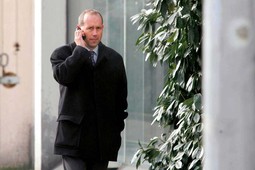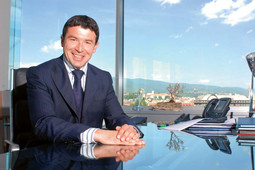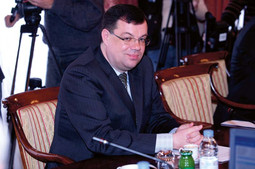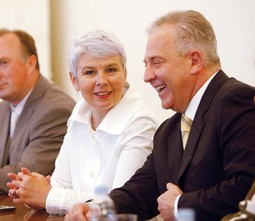HELP FROM LJUBLJANA Bojan Petan, owner of Terme Catez, the Slovenian investor into Adriatica.net
Instead of the state, the key role in salvaging the tourism group Adriatica.net will be played by domestic and foreign privately owned companies. One of the latest investors is the Slovenian Terme Catez, whose entry into the ownership structure of Adriatica.net was announced late last week, and the entry of a, for now secretive, German partner and some European development banks is also not excluded, who might join the salvaging of Adriatica.net now or soon after the planned recapitalisation.
And while the unravelling of the long agony of Croatia's largest tour operator has been expected for months now, the only thing that is certain for the moment is that Adriatica.net will not go into receivership. That, namely, does not suit any one of the interested parties, but the final conclusion of the recapitalisation of Adriatica.net was delayed for a time by last week's decision by Croatian Prime Minister Jadranka Kosor that the state, i.e. companies owned by the state, would not play the key role in salvaging Adriatica.net.
Jadranka Kosor made this political decision after almost a month of deliberation on what to do with Adriatica.net. Her former boss Ivo Sanader, in the meantime, under very suspicious circumstances, tried to get involved in the deliberation concerning Adriatica.net. In early November, namely, he spent several days in Germany's Essen where he, among other things, met with the leaders of WAZ, the German media corporation that owns the Croatian media company Europapress Holding.
The meeting, which was a secret to all in Croatia until last week, only to be confirmed by WAZ spokesman Paul Binder, hinted at the possibility that the former Croatian Prime Minister intended to get involved in the final resolution of the recapitalisation of Adriatica.net, interrupted when approval was needed for state owned companies to participate in salvaging the tourism group. Grasping that her colleague up to recently was promoting himself abroad as a "fixer" that could, in spite of leaving the political arena, use his connections and influence on the Croatian national leadership, Prime Minister Kosor decided to demonstrate her political clout with a decision that the state would play only a minor, rather than the key role, in rescuing Adriatica.net.
And while there had been talk for months on salvaging Adriatica.net, it was Nacional that three weeks ago revealed the details of an agreement in which the key roles were to have been played by state owned companies.
And so four privately owned investors, Agrokor, Jolly-projekti, Saponia and Zagrebacka Bank, were to have taken part in the recapitalisation, along with four state-owned firms, Croatia Insurance, ACI, Croatia Airlines and Jadrolinija. According to the initial idea each of the investors in the recapitalisation would have come in with five million euro, which would have pooled the necessary 37 million euro needed to resolve the accumulated debts of Adriatica.net, and in return the new partners would enter the Adriatica.net ownership structure with an average stake of 13 percent.
And while there are irrefutably valid arguments in favour of salvaging Adriatica.net, a part of the business sector and political scene nevertheless received the plan with a measure of reservation, which can be boiled down to the simple question - if the state decides to save Adriatica.net, why would it not then get involved in the same fashion in resolving the cases of, for example, Varteks, or many of the construction companies that have, as a result of the recession and reduced scale of work, also fallen on hard times? There were also major objections to the announcement that Croatia Airlines would also participate in salvaging Adriatica.net which, with its own deficit of almost a hundred million kuna, is itself in troubled waters, which would lead to the grotesque scenario of a faltering company helping to save another faltering company.
Aware that the initial plan might fall through, that is to say that some of the state owned firm could drop out of the entire job, the top management at Adriatica.net launched a speedy search for alternative investors. The first to agree was Andelko Leko, whose HUP had previously been cited as a possible partner. The top people at Adriatica.net had led months of negotiations with Leko, and it had appeared that he had finally abandoned the idea of entering Adriatica.net, when he changed his mind and joined the other partners. After concluding that there were no more potential partners in Croatia, the leaders of Adriatica.net began serious negotiations with Slovenian companies.
Possible candidates to enter the recapitalisation process at Adriatica.net in the neighbouring country were Mercator and Terme Catez. As far back as at the start of autumn the Slovenian press had written about Mercator's intention to expand its operations in the region over the coming months. In the context of Croatia there was word of the possibility that it would purchase retail supermarket chains Billa or Plodine, even Getro, while the recapitalisation of Adriatica.net was cited as a very serious option.DOMESTIC CAPITAL Hrvoje Vojkovic, CEO of Croatia Insurance, one of the rare Croatian companies allowed to participate in the recapitalisation of Adriatica.net
To anyone who understands business, however, it was clear that this was the least likely option, because an already existing partner - Ivica Todoric's Agrokor - would, and clearly did, oppose Mercator's entry into Adriatica.net. Besides the primary interest of putting its capital to work generating more capital, each of the investors has a clear secondary interest - guests of Adriatica.net will sleep in HUP hotels, eat food from Konzum and wash their hands with Saponia soaps.
When the recapitalisation of Adriatica.net is viewed through this prism it becomes quite clear why Agrokor could not agree to have Mercator take part in the same deal, whose products would be a direct competitor to the range of products offered by Agrokor.
That is why Mercator dropped out of play very quickly, and instead of it the top management at Adriatica.net intensified their negotiations with Bojan Petan, the Slovenian media tycoon and owner of Terme Catez. That company had been interested back in 2002 in buying up Suncani Hvar, prevented then as a result of the anti-Slovenian hysteria of the time, and the Orco company appeared as a partner to the state in the deal. Petan, however, never abandoned his wish to expand operations into Croatia, which he could now succeed in doing.
Of course, the leaders of Adriatica.net led parallel negotiations with all potential investors, because if they would all agree in the end, it would disperse the risk and improve the rejuvenation of the tourism group, which needs to launch its preparations for the coming tourism season as soon as possible. At the same time conflicting signals were coming out of Croatian Government. The portfolio minister, Damir Bajs, advocated as much state assistance as possible in salvaging Adriatica.net because it was a company important to Croatian tourism. In making the evaluations the possible bankruptcy of Adriatica.net was kept in mind, which would, besides seeing over a thousand Adriatica.net employees out of a job, have a negative influence on the entire tourism sector. On the other hand, some other ministers argued that the state could not afford to assist a company that was, in the final tally, a private one, in these difficult economic times. A high-ranking Croatian Government official explained this position last weekend for Nacional saying, "If Adriatica.net can be salvaged, so be it. But the state cannot and must not play the key role in this, because we would immediately be awash in appeals from other companies who would ask - why did you not save us too?"
As a result of it all the opinion that coalesced within Government was to support salvaging Adriatica.net in principle, and to do so by allowing Croatia Insurance and perhaps ACI to take part in the recapitalisation, but to exclude money losers like Croatia Airline from the deal, and perhaps also Jadrolinija.
This would probably have been the quiet denouement, carefully announced to the public, had Germany's WAZ and former Croatian Prime Minister Ivo Sanader not gotten involved. The top management at WAZ, a co-owner of Europapress Holding (EPH), has allegedly over the past few months increasingly demonstrated its unhappiness and impatience towards its Croatian partners - EPH and Ninoslav Pavic. The reasons for this are a series of problems already well known to the Croatian public, from Pavic's unresolved relationship with Miroslav Kutle, the delays in the takeover of newspaper Slobodna Dalmacija, the entire problem with Adriatica.net and the growing financial tribulations at EPH. Since, by all accounts, the leaders of WAZ are either not informed or do not understand the political and social circumstances in Croatia, they turned for help in the recapitalisation of Adriatica.net to the entirely wrong person - Ivo Sanader.
After it was reported in the Croatian press in early October that the former Prime Minister had started working for Canadian millionaire Louise Blouin, his public image worsened, as it appeared that after his flight from the post of Prime Minister, Sanader, who still receives a wage from the national budget, was spending time with the rich and idle, and had left the country in dire straits. This past month Ivo Sanader has not spent much time in Croatia, and has made frequent trips to German speaking countries where he is trying to portray himself as a lobbyist who still wields significant influence in the Croatian national leadership.
And so, according to Nacional's sources, he travelled to Germany's Essen in early November which is home, among other things, to the seat of the WAZ media group. Ivo Sanader has for a number of years been on very good terms with Bodo Hombach, the former Stability Pact coordinator who has been at the helm of WAZ since 2002, and with former Macedonian diplomat Srdan Kerim, who in 2003 became WAZ director for Southeastern Europe. It was in fact at their invitation that Sanader at about the same time last year, still as Croatian Prime Minister, was in Essen where he held a lecture organised by the Ruhr Political Forum.
STATE ASSISTANCE Tourism Minister Damir Bajs advocated that the state play as high level a role as possible in salvaging Adriatica.net
Nevertheless, although there was speculation last week in the Croatian public that Sanader's trip to Essen this year was connected only to WAZ, that in fact, is not entirely true. Essen is also home to the seat of the German energy company RWE, which has for some time been interested in the privatisation of the Croatian electric power company HEP. Sanader maintained good relations with the heads of this company while serving as Prime Minister, and RWE was one of the partners in the Adria LNG project.
When Sanader left the post of Prime Minister in early July, RWE was very concerned about its continuing cooperation with the Croatian authorities, and by 15 July, Jürgen Grossmann, the RWE CEO, had rushed to Zagreb to meet with the newly appointed Croatian Prime Minister. After the meeting a press communiqué was released by Government detailing the successful cooperation, but later developments hinted that the top people at RWE were not entirely happy about their cooperation with the new Croatian Prime Minister, or that former Prime Minister Sanader had shown a great deal more understanding for their business interests in Croatia. Without an explanation, RWE on October 20th pulled out of the Adria LNG consortium. Nevertheless, Nacional's sources point out that RWE has not lost interest for HEP, and the company's management recently invited Ivo Sanader to Essen for a meeting.
For now it is not known what the top people at RWE wanted from the former Croatian Prime Minister, or whether he offered them his services as an advisor of lobbyist.
During his time in Essen Sanader obviously contacted Bodo Hombach, who invited him for a meeting at the WAZ headquarters. By all accounts the leaders of WAZ were not aware of Sanader's current situation, that is to say the fact that his image in the Croatia public is worsening every day, and at the same time any influence he might have is rapidly diminishing. That is why it comes off as a bad joke of sorts that the top people at WAZ might ask Sanader to use his influence on Prime Minister Kosor or on some potential investors to help in the recapitalisation of Adriatica.net.
Prime Minister Jadranka Kosor with her predecessor Ivo Sanader
The meeting between Ivo Sanader and the WAZ CEO would probably have remained a complete secret had most Croatian editorial desks not received an anonymous e-mail last week depicting the alleged electronic correspondence between Bodo Hombach and Ninoslav Pavic. In an alleged message to Pavic Hombach states that Ivo Sanader promised his help in the recapitalisation of Adriatica.net, to which Pavic reacted sharply, explaining that any engagement in the process on the part of Sanader would have damaging and harmful consequences. And while EPH and WAZ quickly issued press communiqués denying the authenticity of the messages, the WAZ spokesman did admit to some of the Croatian press that Ivo Sanader had recently been at their headquarters in Essen. The information was evidently enough for Croatian Prime Minister Jadranka Kosor to conclude that her predecessor was trying to influence the decisions made by Croatian Government. The only way to thwart him in doing so, but also to sent everyone else a clear message of Sanader's current possibilities, was to entirely compromise him with the public announcement of a decision that there was no chance that the state would be the key party to the salvaging of Adriatica.net.
The EPH position
■ In spite of the fact that the effort to recapitalise Adriatica.net is subject to frequent changes and that the final outcome is still uncertain, at EPH, a company with a stake in Adriatica.net, they emphasise that they are not concerned about the latest developments, i.e. Government's decision to not play a major role in rescuing the privately owned tourism group. Stipe Oreskovic, president of the Board of Directors at EPH, told Nacional last weekend that the, "Recapitalisation of Adriatica.net should secure a mix of investors that meet three criteria: investors that depend on the success of tourism in Croatia, investors from abroad, if at all possible from emitter markets, and finally the real and symbolic support of the public sector. There is no need to repeat what implications are present in the fate of a company that secures over thirty percent of organised tourism and has operations with dozens of hotels and hotel chains in Croatia. That would achieve what Croatia needs, and that is a tour operator for whom the Croatian market is the priority. Pooling that kind of investor group was not an easy task, especially in conditions of economic crisis, and that is why we had to wait several months. I believe we are nearing the end of the process. We are also talking with potential partners who would, after the recapitalisation in 2009, participate in the additional strengthening of the group, and these are investors from Germany and development banks that have already shown an interest in Adriatica.net," Oreskovic told Nacional.
THE FORMER PRIME MINISTER travels to Essen
■ Former Prime Minister Ivo Sanader tried to get in on the effort to salvage Adriatica.net. Paul Binder, a spokesman for WAZ, a German media corporation with a stake in Croatia's EPH, confirmed that Sanader met with top WAZ officials in Essen in early November. The assumption is that Sanader would, in the role of a "fixer", get involved in the final stages of the recapitalisation of Adriatica.net. He has allegedly contacted WAZ CEO Bodo Hombach, who was evidently unaware of Sanader's currently poor image in Croatia and the fact that he no longer has any influence on the decisions made by the national leadership. The current unravelling of the situation surrounding Adriatica.net demonstrates that Sanader truly did not and could not have had any significant role as a mediator.








